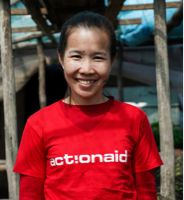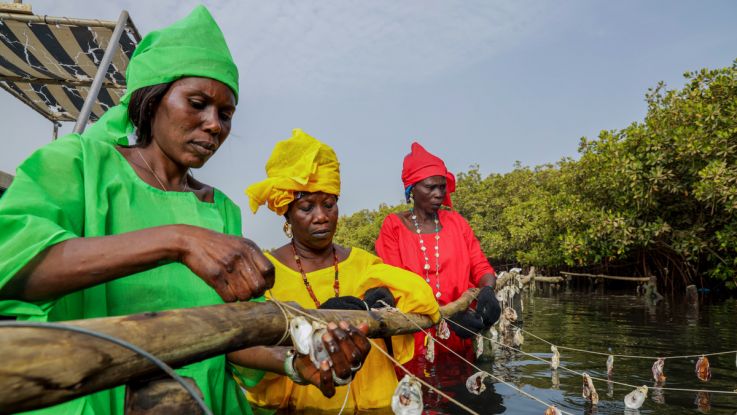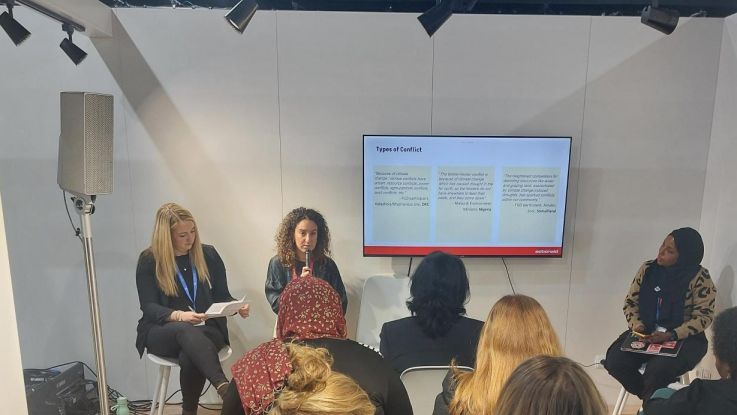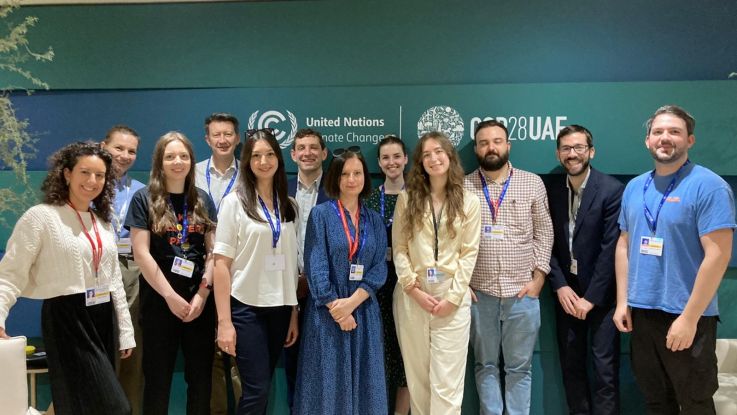Turning the tide on climate crisis in Cambodia
5 March 2021
For some people perhaps climate change is still an invisible notion, its potential, material repercussions maybe not real enough to see just yet.
But where I live, in Cambodia, climate change-related disasters are a very real and palpable menace. Unpredictable rain, severe floods and violent storms are already here — they are happening right now — and they are washing away our way of life.

An aerial view of Kampong Kneas village, Pursat province, Cambodia. Photo: Cindy Liu/ActionAid
I am Samphy, and as a Programme Officer at ActionAid Cambodia, I work closely with local women to help them fight the catastrophes caused by climate change and support them to survive the worst of its effects.
I work in local neighbourhoods to identify what women need most. I train them to be leaders of their communities and help them shift to a more sustainable way of finding food and making a living.
Long-lasting droughts, violent storms, sudden floods – all have wreaked havoc on the local fishing communities who have lived off our local rivers and lakes for generations.
Millions of vulnerable people – who are already struggling to survive – are finding it even harder to find food, clean water, and earn an income.
And when families cannot earn enough from fishing or farming, they often have to send their children out to find work, to do odd jobs, to help at home or on the boats instead of sending them to school.
Yet Cambodians have done little to create this predicament we’re in.
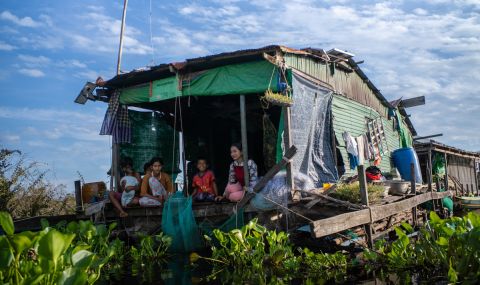
Life in the floating village in Pursat, Cambodia. Angkor Films/ActionAid .
How the climate crisis is affecting Cambodia
Water is life here in Cambodia. These rivers and lakes, our legacy.
Much of Cambodia is a floodplain, with 85% of the country’s land within the lower Mekong basin.
The Tonle Sap Lake is the heart that pumps life into the local ecosystem and along with the Mekong River provides sustenance for millions of people.
The heartland of plains, mangrove forests and paddy fields surrounding the lake and rivers, are intricately woven into our everyday existence. Over a hundred species of fish migrate here and provide the main source of protein and profits for the rural population, and rice - the most important field crop in Cambodia is sown and harvested here annually.
But we are slowly losing this local heritage and way of life to forces we cannot control.
Cambodia is considered one of the more vulnerable countries to climate change’s worst impacts.
The wet season is getting wetter and threatens to flood our homes and destroy rice crops, while the long, dry season grows longer and hotter and decreases the levels of water in the rivers. Both changes are disturbing the spawning and migration of fish and are permanently damaging the fragile biosphere.
People are scared. They worry their homes will collapse in storms; their fishing paraphernalia will wash away at night as they sleep; that their boats may capsize if they go out during gales
Wet season
During the monsoon period or wet season, we experience the annual swelling of the rivers and lake which brim over into the basin and breathe life into the local environment. This is when we grow our rice; when forests animate with plant and bird life and fish start to breed and thrive in the wetlands.
But in recent years, climate change has brought intense and erratic rainfall. Now, frequent low storm clouds whip up heavy rains and generate flash floods so large that they slosh at the doorsteps of homes, even those standing on unscalable stilts.
For rice farmers, torrential rains, wind and excess water is anathema. Their rice seedlings are drowned and winds threaten to flatten any crops. Many have to replant several times a year when their rice paddies are submerged.
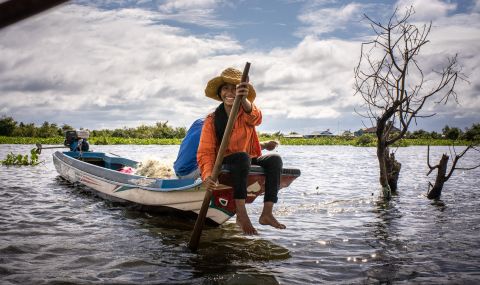
Makara, 14, helps her father to fish every morning before school in Pursat, Cambodia. Cindy Liu/ActionAid .
Dry season
Then the dry season comes when rains and storms are meant to recede, the lake is at capacity from the recent summer rainfall and men and women get ready to harvest their rice and cast their nets wide. The fishing season finally arrives.
But the dry season keeps drawing out longer each year and creating devastating drought periods. Rain and floodwaters arrive later each year, water levels are sinking to an all-time low with each passing season, and wet forests that provided a breeding sanctuary for fish and wildlife are drying out or burning up.
The dry season has also brought unseasonable strong winds to the lake, and with natural wind barries like mangrove forests being destroyed, fishing is becoming a perilous activity.
In the coming years, both floods and droughts are set to get worse.
People are scared. They worry their homes will collapse in storms; their fishing paraphernalia will wash away at night as they sleep; that their boats may capsize if they go out during gales; that they will go into debt paying for repairs to boats and homes battered in sudden squalls — but most significantly that their fish yield is falling.
As fish stocks plummet, fisherfolk are fishing for longer and during offseasons. They are spending more time on the boat, pulling their children out of school for extra manpower to help with the extended fishing periods, and venturing into fishing sanctuaries, depleting the breeding fish stocks and running the risk of getting caught.
All of this is increasing the stress on local women and girls and pushing them further into poverty.
Why women and girls - how does climate change affect them?
We know that climate change disproportionately affects women and girls around the world because of already existing inequalities.
Women are more likely to experience greater poverty than men. They tend to have less decision-making power; they rarely own the resources and tools they rely on and have less access to money or capital. Information on how to predict and prepare for disasters is often not shared with women, which affects their chances of adapting to and surviving a crisis.
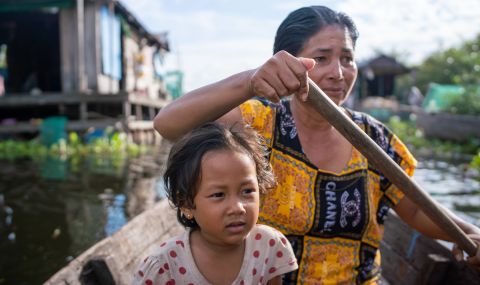
In Cambodia, women and girls spend more time out on their boats to find enough fish to eat and sell. Angkor Films/ActionAid .
In Cambodia, rural women are more dependent on natural resources like the floodplains, lake and rivers for their food and income. This dependency on water and land makes them more vulnerable to the impacts of climate change.
It is usually women who also dominate informal, rural or poorly paid workforces such as agricultural processing and small-scale fisheries.
And when climate change depletes their resources and kills their jobs, women are often less able than men to turn to alternative forms of work easily, further exacerbating their poverty.
Women and girls also shoulder the burden of unpaid care work and responsibilities towards children. In Cambodia, while men migrate to urban cities, mothers and grandmothers are often left looking after children and grandchildren.
In times of need, girls may be taken out of schools to help with fishing, agriculture, and household chores.
These are the very real problems happening right now to women and girls. I hear them in the chatter on the passing boats, out in the fields where we harvest the rice, in the footsteps of barefoot girls outside making ends meet, and in the cries of little children who have had nothing to eat for days.
Casting the net: surviving climate change in Cambodia
I meet Heng a 36-year-old fisherwoman at her home one day. She shares her house with her husband and daughters. She told me how generations of her family have fished for a living and rely on it for nourishment and income.
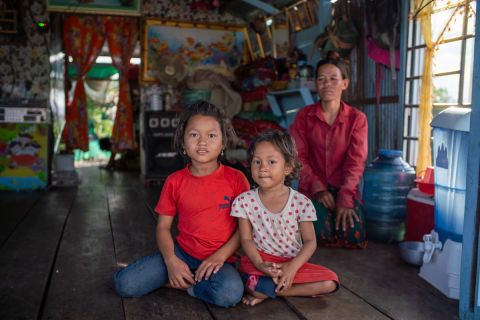
This year is especially harder. It was very difficult. The strong winds keep on coming. I wouldn’t dare to go out fishing. I pray for it to stop. I depend entirely on the weather.."
The water is very choppy, and we’re scared that the boat may sink. We also have to take the children with us because there’s no one at the house to look after them,” Heng told me.
In previous years, our family situation was okay. This year, I am in debt to many people, there’s no water, there’s no stable income. Sometimes, when we go fishing, we only get one or two fish.”
Without enough fish, Heng and her family are eating less and have to look to other ways of surviving. She pulls Punthea from school so she can do small jobs around the neighbourhood or collect scraps of metal to sell for a small sum. With that money, they’re lucky if they can buy rice and salt for a day’s meal.
“There’s just nothing else we can do. I do feel bad for my children... we just don’t have any choice.”
It is hard to watch Heng and other women struggle every day. They are not just being deprived of their life-long food source and their living; they are on the precipice of losing their identity. For fishing communities, this way of life is their legacy.
But Cambodian women are not utterly powerless, they are a force to be reckoned with.
These women are the key to the climate crisis – the answer to building a more sustainable planet that puts our land, lake, rivers and its people first.
Why women are the answer
Even though women are more likely than men to be affected by climate change, they are also part of the solution.
Rural Cambodian women are positive agents of change. They are developing solutions and building their resilience to the crisis.
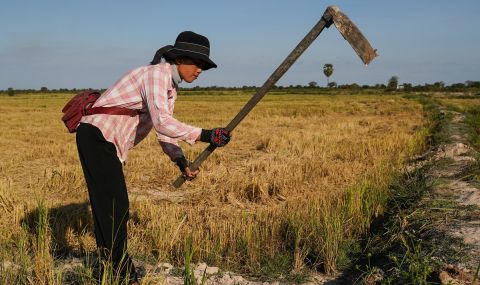
Hok grows rice for a living and trains other farmers on how to adapt to climate change. Cindy Liu/ActionAid .
Women hold critical knowledge about our environment, our neighbourhoods and how to conserve resources. Their roles within households and communities mean they often act as stewards of resources. And when they are represented and involved in decision-making, it doesn’t just benefit them and their own families, but whole countries thrive.
Not only that, women like Heng are often keen to adopt new knowledge and alternative ideas in communities where sometimes resistance to change can be high.
When ActionAid came knocking, Heng was ready to take the leap: “I want to plant some vegetables...so it can help generate some income to solve our problems just in case I can’t go fishing," she told me.
ActionAid also provided her with some capital so she could set up a fish processing business.
Then there are community leaders like 35-year-old Hok who represent their region and bring local issues to regional and national meeting tables to help turn things around for their fellow farmers and fisherwomen.
This is why ActionAid believes in the power of investing in women and girls.
What ActionAid is doing in Cambodia and around the world
For the past five years, ActionAid has led pioneering solutions in Cambodia to help women cope with the vagaries of climate change.
We are encouraging multi-generational families - grandmothers, and mothers - fisherwomen who have only known fishing all their life, to pivot to new ways of making a living as climate change slowly alters their surroundings.
We provide women with seeds, tools, capital and training so they can turn their boats into floating gardens and greenhouses to grow climate-resilient vegetables to feed their families and still keep a part of their heritage - through their boats - alive.

ActionAid is helping women turn their boats into floating gardens of vegetables to ensure they have enough to eat and sell. Ratana/ActionAid .
We are empowering women to take on leadership roles and become what we call Women’s Champions.
Women’s Champions are community figureheads trained in advocacy, campaigning, and leadership skills so they can speak on behalf of their communities at local and national meetings about climate change and the environment.
With their help, we are sharing vital skills with other women to build their community’s resilience to climate change.
ActionAid is also helping by providing boats so children can go to school, building water wells for clean sources of water, and giving out food donations when needed.
When all of this is in place, and women don’t have to worry about where their family’s next meal is coming from, they won’t have to cut back on their children’s education; they can repay their loans and not fall into the debt cycle, and they can finally look towards the future with solid ground beneath their feet.
How you can help to fight climate change
The water and wetlands don’t just play a quotidian role in our life. They signify harvests, happiness and are a harbinger of hope.
But to save the forests, the lake and rivers - that are buckling under the weight of climate change - and to rescue the lives attached to them, we need to act now.
Because even though for some people, climate change may seem a far-off reality, here in Cambodia, the climate crisis has already arrived— and it is getting worse.
Million more people in Cambodia are going to be affected by uncertain seasons ahead this year and the coming years.
Time is of the essence, as the drought dries out our rivers right now and the destructive floodwaters inevitably rise next rainy season. For women and their communities, there is no time to waste.
But I am hopeful that women can lead the way.
If you give just £7 a month to ActionAid you can help make sure women like Heng have a fighting chance today and women like Hok can lead their communities into a safe and brighter future tomorrow.
Women are the answer. I hope you can join us in tackling one of the biggest calamities facing our planet and the human race.
